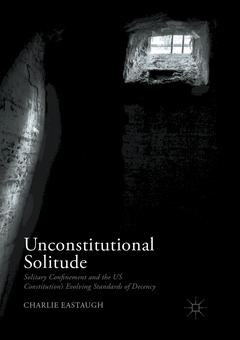Description
Unconstitutional Solitude, Softcover reprint of the original 1st ed. 2017
Solitary Confinement and the US Constitution's Evolving Standards of Decency
Author: Eastaugh Charlie
Language: English
Subjects for Unconstitutional Solitude:
Approximative price 58.01 €
In Print (Delivery period: 15 days).
Add to cartPublication date: 08-2018
Support: Print on demand
Approximative price 116.04 €
In Print (Delivery period: 15 days).
Add to cartPublication date: 10-2017
Support: Print on demand
Description
/li>Contents
/li>Biography
/li>Comment
/li>
This book examines American solitary confinement ? in which around 100,000 prisoners are held at any one time ? and argues that under a moral reading of individual rights such punishment is not only a matter of public interest, but requires close constitutional scrutiny. While Eighth Amendment precedent has otherwise experienced a generational fixation on the death penalty, this book argues that such scrutiny must be extended to the hidden corners of the US prison system.
Despite significant reforms to capital sentencing by the executive and legislative branches, Eastaugh shows how the American prison system as a whole has escaped meaningful judicial oversight. Drawing on a wide range of socio-political contexts in order to breathe meaning into the moral principles underlying the punishments clause, the study includes an extensive review of professional (medico-legal) consensus and comparative transnational human rights standards united against prolonged solitary confinement. Ultimately, Eastaugh argues that this practice is unconstitutional. An informed and empowering text, this book will be of particular interest to scholars of law, punishment, and the criminal justice system.
Chapter 1. The Hidden Corner of the Prison.- Chapter 2. An Adjudicative Framework: Morality and the Punishments Clause.- Chapter 3. The Eighth Amendment’s Evolution.- Chapter 4. National Consensus by State Counting.- Chapter 5. Proportionate Penology.- Chapter 6. Transnational Law.- Chapter 7. Professional Consensus.
Dr Charlie Eastaugh is a Visiting Fellow at the University of Surrey School of Law, UK.
Argues that solitary confinement, as practiced in the United States, is unconstitutional under the evolving standards of decency that mark the progress of a maturing society
Combines professional (medico-legal) consensus with comparative legal standards found in UN instruments and regional human rights systems
Uses moral theory to frame a practical, constitutional attack on solitary confinement
These books may interest you

Prisoners' Rights 299.04 €



